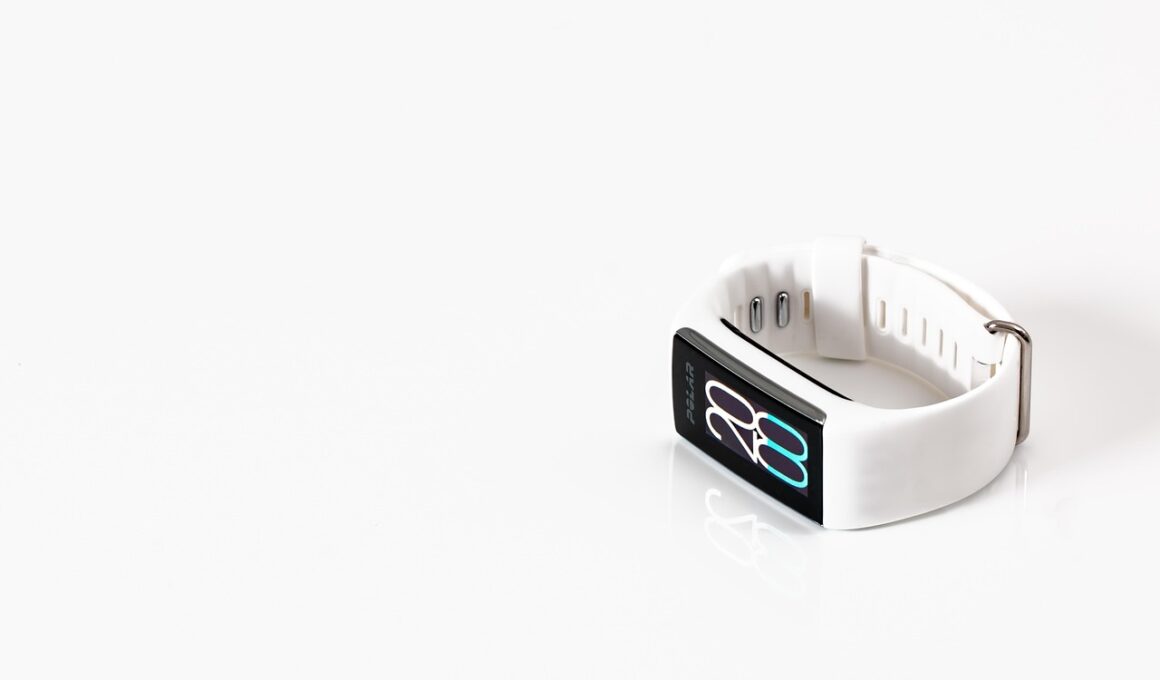How Reliable Are Fitness Trackers for Measuring Calories Burned?
Fitness trackers have surged in popularity, promising an insightful look into our daily activities and caloric burn. However, the accuracy of these devices, particularly when measuring calories burned, is often questioned. While many users trust their trackers, studies show that accuracy can vary significantly. Factors such as user input of personal data, heart rate measurements, and even the device’s calibration methods play crucial roles. Many trackers rely on algorithms that estimate caloric expenditure based on activity type and intensity. This method works reasonably well for some, but less so for others, particularly in more complex exercises. When users perform activities like weight lifting or cycling, results may not reflect actual calories burned accurately. Furthermore, hydration levels, environmental conditions, and individual metabolism can influence these readings. As such, while fitness trackers provide a convenient way to monitor fitness levels, users should approach the data with caution. They are best used as motivational tools rather than absolute measures. Understanding the limitations of these devices is key in harnessing their potential, enabling users to complement them with traditional assessments for a comprehensive view of health outcomes.
Adopting a fitness tracker can lead to behavioral changes that enhance health, but discrepancies in their calorie count can lead to misconceptions. Users often become overly reliant upon the numbers generated by their devices. This reliance might promote a false sense of security concerning dietary habits and exercise routines. Feeling as though they can eat more due to higher calorie counts recorded can lead to weight gain instead of the intended loss. It is essential for fitness enthusiasts to calibrate their expectations and recognize that variations in readings can occur. A study published in the Journal of Sports Sciences suggests that while wrist-worn fitness trackers may not be perfect, they can help users stay motivated. Those who engage with their trackers regularly are more likely to adhere to fitness goals. Complementary methods such as keeping a food diary or consulting health professionals can enhance users’ efforts. By combining information from fitness trackers with a rounded approach to wellness, individuals can achieve better outcomes. A holistic view leads to informed decisions regarding calorie intake and overall healthiness, thus avoiding common pitfalls associated with overestimating fitness advancements based solely on tracker readings.
The Science Behind Calorie Measurement
The fundamental science behind calorie measurement is based on energy expenditure and metabolic rates. Fitness trackers primarily use heart rate sensors and accelerometers to gauge activity levels. When users engage in physical activity, these sensors establish an estimate by calculating the intensity and duration of the exercise. However, inaccuracies arise when users don’t enter their specifics like age, weight, or gender correctly. This information is vital, as different individuals can expend vastly different amounts of energy during the same activity, based on size and fitness level. Additionally, most fitness trackers estimate your resting metabolic rate, a critical factor in total calorie expenditure. Still, these calculations are not always precise, as the trackers employ generalized formulas that may not apply to everyone. The result can be overestimating or underestimating calorie burn, leading to confusion. For a clearer understanding of their fitness levels, users must consider these nuances. It’s beneficial to compare tracker data with methods like metabolic testing, which provides a more accurate calorie burn measurement. By doing so, users can leverage technology while also engaging in comprehensive wellness approaches for better health results.
Most fitness trackers offer various features, but it’s crucial to understand their limits and advantages. Users can utilize a blend of functions, from step counting to GPS tracking, to gain insights into their fitness behaviors. However, when it comes to calorie counting, relying on the device alone may not yield the most accurate results. The metrics provided can serve as a motivational catalyst for many individuals. They can visualize their activity levels and set realistic goals. Yet, a barrier could arise when individuals take data too literally. Incorporating alternative methods of calorie counting, such as professional assessments or manual tracking, can enhance the accuracy of overall insights. Remember, not all trackers are created equal; for instance, some models are known for superior heart rate accuracy compared to others. Users often report that particular brands seem more reliable based on personal experiences. Therefore, it makes sense to research and consider reviews before investing in a fitness tracker. This allows individuals to better meet their personal fitness requirements and expectations, ultimately resulting in a more fulfilling and informed fitness journey.
Consumer Concerns About Fitness Trackers
Despite their convenience, some consumers have raised concerns about data accuracy with fitness trackers. This is especially true when individuals participate in diverse exercise routines encompassing different intensities and movements. The inconsistent readings regarding calories burned can lead to confusion and skepticism about the product’s credibility. Users may find themselves second-guessing the data presented by their trackers, resulting in frustration. Another area of concern relates to the ethical implications surrounding user data. With many devices relying on cloud services to sync and store information, privacy risks have become paramount. Moreover, individuals worry about how their data might be used by manufacturers and third-party partners. Transparency in how this data is collected and stored is incredibly important for consumer confidence. As such, brands need to adopt ethical data practices and prioritize user control over how personal information is utilized. Long-term loyalty can hinge on the company’s commitment to integrity in handling user data. By addressing these concerns candidly, manufacturers can enhance trustworthiness, ultimately impacting users’ willingness to adopt these technologies into their daily lives.
While fitness trackers can offer valuable insights, maintaining balance is key. Individuals should not overly fixate on the figures displayed, especially when it comes to calorie counts. Approaching health and fitness as a holistic venture is vital for achieving enduring success. This can be achieved by integrating conventional wisdom regarding nutrition and physical activity with modern technology. A balanced diet, regular exercise, and adequate rest contribute to effective weight maintenance and overall well-being. Using fitness trackers can facilitate positive habits, like regular monitoring of physical activity and food intake, which can ultimately aid in meeting fitness goals. By remaining aware of potential inaccuracies, users can utilize their devices as a guiding tool rather than an absolute source. Connecting with a community, whether online or in-person, provides further support in accountability. Sharing experiences can enhance motivation, fostering a collective commitment to health journeys. Ultimately, by blending digital and traditional approaches, users can maximize their understanding of personal health, leading to informed decisions about caloric intake and energy needs. Adopting a well-rounded perspective can lead to significant improvements in quality of life and fitness results over time.
Conclusion and Recommendations
In conclusion, fitness trackers can be beneficial for tracking activities and calorie expenditure, but users should understand their limitations. Relying solely on these devices can lead to unrealistic expectations and potential health pitfalls. To achieve a more realistic assessment of caloric burn, consider supplementing fitness tracker data with professional assessments or manual calorie tracking methods. Users should continuously educate themselves about the various factors influencing accuracy, including personal data entry and diverse activity levels. Doing so will create a more rounded perspective on their individual fitness journeys. Incorporating both technological resources and traditional wellness practices enhances the potential for meaningful improvements in health and fitness. Make the most out of your fitness tracker by setting personalized goals, monitoring progress, and maintaining an open mind towards data interpretation. Balancing technology with practical wisdom about fitness can lead to sustainable results in health and well-being. Seek feedback from fitness professionals to further fine-tune your approach and adjust expectations. Ultimately, the goal should be to foster a healthy relationship with both data and exercise, supporting a long-term commitment to fitness.
By considering the insights provided by fitness trackers while adopting a broader approach to health, users can cultivate a more sustainable fitness lifestyle. This involves looking beyond mere numbers and embracing holistic habits that promote well-being. Relying solely on technology may hinder genuine progress; hence, it is vital to remain mindful of the multifaceted nature of health. Acquiring knowledge about these devices encourages individuals to use them wisely, leading to informed choices regarding exercise and nutrition. By accepting both strengths and limitations of digital fitness tools, users can optimize their experiences with fitness landscapes. This ultimately enhances the understanding of personal fitness journeys. Combining data insights with personal intuition and guidance from wellness experts substantially boosts the overall understanding of health and fitness goals. Remember, the journey towards improved fitness is as much about enjoyment as it is about results. Celebrate small victories along the way and learn to appreciate the process. Consider social elements, engage in community activities, and foster supportive relationships in your fitness journey. In doing so, you will enhance not just the results, but the overall experience of pursuing a healthier and happier lifestyle.


